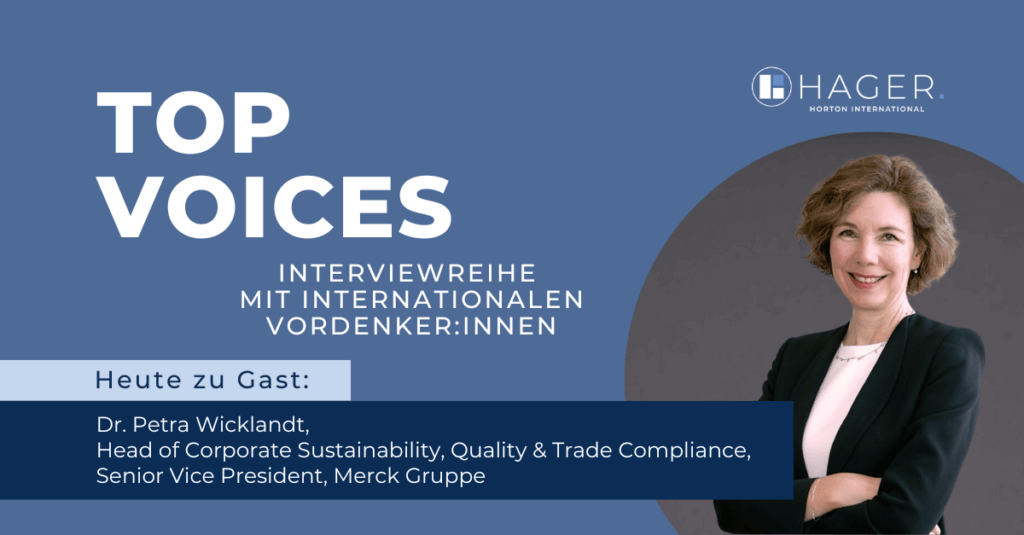
Interview with Dr. Petra Wicklandt, Leiterin der Abteilung Corporate Sustainability, Quality and Trade Compliance, Senior Vice President, Merck Group, Darmstadt
After the Merck Group decided to make sustainability an essential part of its corporate strategy, a lot has changed within the Group. In an interview with HAGER Executive Consulting, Dr Petra Wicklandt, Chief Sustainability Officer at Merck, explains how the implementation of the ambitious sustainability strategy is being driven forward. You can also find out what is now changing for applicants.
Three years ago, you completely revised and reorganised your sustainability strategy at the time. What was the impetus for this?
Dr Petra Wicklandt: ‘We lacked an overarching goal, a systematic approach. Our Corporate Responsibility Department produced an annual sustainability report, in which we already reported on many topics, but the Healthcare, Life Science and Electronics divisions each had a different focus and considerations. On the one hand, the new strategy gives the topic of sustainability much greater weight, and on the other, everyone is working on what is a priority. We have resolved to firmly implement sustainable business practices – which for us is synonymous with profitable growth. We want to be economically successful and at the same time make a positive and measurable contribution to society through our business activities. As a global science and technology company, we are measured by this responsibility.’
‘We believe that sustainability is not only the best thing for the world, but also the best thing for a company.’
Dr Petra Wicklandt, Merck Group
What values and goals is the new sustainability strategy based on?
‘We have defined three pillars or goals, which in turn are underpinned by seven focus areas. The years 2030 and 2040 are fixed points. We have set ourselves the goal of achieving progress for more than one billion people by 2030 through sustainable science and technologies. Our technologies and products should contribute to health and quality of life. The second pillar involves the sustainable design of the entire value chain, including our supply chain. The third pillar is entirely dedicated to reducing our ecological footprint. Among other things, we want to reduce waste and improve the quality of our waste water. Our goal is to achieve climate neutrality by 2040. Until then, we will report annually on the current status of the realisation of our sustainability strategy.’
How are the three objectives currently being implemented?
As we have set ourselves different priorities, we are at different stages of implementing our goals. The biggest challenge for the Electronics division is clearly the reduction of greenhouse gases. Compared to Healthcare and Life Science, this area has the highest CO2 emissions. In Healthcare, we are focussing on the topic of social responsibility, which includes, for example, access to medicines for vulnerable patient groups in countries where access is more difficult, to innovative medicines, but also to traditional products such as thyroid hormones. In Life Science, we are dealing with more than 300,000 products that are used in drug research, for example. The aim here is to look at each individual product and consider how we can make it more sustainable.’
What makes such a comprehensive strategic approach possible in the company?
‘That’s right. In the sustainable value chain that we pursue, we have our suppliers and customers in mind. For example, in addition to our greenhouse gases, we also measure the indirect emissions that our suppliers produce when they manufacture products for us. We have already provided half of our suppliers with a sustainability assessment in this regard. Collaboration with suppliers and customers also drives innovation, which we see as an important key to the success of our sustainability strategy. In the Electronics division, for example, we have entered into a collaboration with the US semiconductor manufacturer Intel with the aim of developing more sustainable materials for chip production.’
Merck makes its knowledge and manufacturing expertise available to companies and academic institutions working on the development of cultured meat (clean meat). Is cell-based meat the food of the future?
‘As one of the leading suppliers to the biopharmaceutical industry, Merck has a high level of expertise in this young technology. We contribute our knowledge in partnerships, including cooperating with start-ups that are conducting research in the field of clean meat. I am firmly convinced that we will no longer kill animals to eat meat in the future. But it’s not just about animal ethics. Clean meat could eliminate cattle farming worldwide and thus reduce greenhouse gas emissions.’
Will we have our own small bioreactors for producing clean meat in the kitchen in 2040?
‘Clean meat will definitely have a relevant market share by 2040. Until then, it is a question of price to what extent it will prevail. Today, cultured meat is still many times more expensive than conventional meat. I don’t see devices for home use, because the production process from real animal cells is highly complex and requires a lot of expertise. It only works in industrial production facilities. The vision for the future is that clean meat products such as beef, poultry, pork and fish will be produced commercially on a large scale. Then the price will also become more favourable.’
Translated with www.DeepL.com/Translator (free version)
‘Clean meat will definitely have a relevant market share by 2040. Until then, it is a question of price to what extent it will prevail. Today, cultured meat is still many times more expensive than conventional meat. I don’t see devices for home use, because the production process from real animal cells is highly complex and requires a lot of expertise. It only works in industrial production facilities. The vision for the future is that clean meat products such as beef, poultry, pork and fish will be produced
No sustainability without animal welfare. What responsibility does Merck see for itself here?
‘Merck is endeavouring to avoid animal testing and to increasingly introduce alternative test methods. In doing so, we are promoting the internationally recognised 3R principle for animal testing. This provides for a reduction in the number of animals required, an improvement (refinement) in the performance of animal studies and the replacement of animal testing with other methods. At Merck, we have added a fourth R for Responsibility, because we feel responsible for the laboratory animals.’
‘Artificial intelligence is also increasingly helping us to replace animal testing.’
Dr Petra Wicklandt, Merck Group
What does this reduction look like in concrete terms?
‘For example, our researchers have developed a new method for batch testing. Some quality tests for the release of batches of biotechnologically produced drugs were previously carried out using animals. More animals were used than in the research and development of pharmaceuticals. We have now established a process that will eliminate the need to use laboratory animals for batch testing in future. Artificial intelligence is also increasingly helping us to replace animal testing. All of this will mean that animals will no longer be used at all at some point.’
How does Merck monitor its partners and suppliers when it comes to animal welfare?
‘Merck is one of the companies that have signed the Marseille Declaration on the global adoption of high standards for the internal and external use of animals for scientific purposes by the pharmaceutical industry. This first joint declaration by the pharmaceutical industry requires compliance with high and uniform standards of animal welfare and laboratory animal science, regardless of where it is carried out. Merck also only accepts the highest standards for external animal testing, and in some cases these are stricter than those of the respective legislators. One example: In the USA, the minimum sizes of animal cages are much smaller than in Germany and Europe. That’s why we don’t want our partners and suppliers there to do without the larger cages that meet our standards.’
Do patients ask about sustainably produced medicines?
‘Not usually where drugs decide over life or death. In oncology, other priorities are relevant. And there is no information on sustainability on package leaflets. However, we have noticed that institutions such as the NHS (National Health Service) in the UK are definitely interested in sustainability. In particular, the so-called product carbon footprint, i.e. the emissions generated during the manufacture of a medicine, are of interest here.’
How does Merck motivate its employees to act sustainably?
‘Our new sustainability strategy has left the door wide open, which was amazing. It was very well received. We encourage our employees to think sustainably – this motivation is key. We have communicated our major sustainability goals in training sessions and with a great deal of effort, and with our more than 64,000 employees worldwide, this is a major yet very important task. When it comes to business-specific goals, we encourage our employees to think for themselves. Even our patent department makes an important contribution to sustainability. They agreed on annual KPIs (key performance indicators) that measure how many patents have a sustainability component.’
Does the sustainability strategy include financial incentives for employees?
‘Progress in achieving our three sustainability targets is linked to variable remuneration for the Executive Board and senior management. There are so-called long-term incentives that run for three years and where the payout is based on target achievement. The short-term incentives include an annual bonus, which is also based on sustainability criteria.’
How would you formulate your credo?
‘We believe that sustainability is not only the best thing for the world, but also the best thing for a company if you think and plan for the long term and want to be successful. Anyone who hesitates to implement sustainability in the face of rising costs will pay dearly for it if, for example, the price of CO2 rises in the foreseeable future and levies become mandatory for more and more areas.’
‘We plan to employ 50% female managers by 2030.’
Dr Petra Wicklandt, Merck Group
How does Merck organise its talent management?
‘We are also pursuing very ambitious goals when it comes to diversity, equal opportunities and inclusion. We plan to employ 50 per cent female managers by 2030 – the current figure is 38 per cent. In the Healthcare division, we are already very close to our target. In Electronics, we hope to have more female university graduates in the future. Merck has always been characterised by diversity – we are active in 66 countries and employ around 140 nationalities.
We realise that we can only continue to be successful if we create an environment that promotes equal opportunities and inclusion. In addition to the gender target, we have set ourselves the goal of attracting people who do not just come from Europe or the USA. By 2030, we therefore want to employ 30 per cent Asian and Latin American managers. We have customers all over the world and want to reflect this reality in our management structures. In addition, 30 per cent of our managers in the USA should come from ethnic minorities in the future – unlike in Germany, belonging to an ethnic group at your employer is generally considered normal in the USA and is therefore also recorded statistically.’
Does the sustainability strategy also change the pool of employees?
‘Basically, we have always emphasised a good mix of long-standing employees with experience in the company and career changers. This is normal and important. With a variety of development and support programmes, we provide talented people in the various business areas with the right tools to realise their full potential. Those who join us share our passion and vision to improve the lives of millions of people around the world. However, the new sustainability strategy has also resulted in new criteria for applicant interviews in close consultation with our HR department, meaning that we ask about personal attitudes towards sustainability as early as the job interview stage. Applicants have to be a good fit for us, and sustainability is an essential part of the selection process and our actions.’
Thank you very much for the interview, Dr Wicklandt!
About Merck:
Merck is a leading global science and technology company in the fields of healthcare, life science and electronics. Merck employs over 12,000 people in Germany and more than 64,000 worldwide, developing, producing and marketing high-quality medicines and innovative products for the biotech and pharmaceutical industries as well as precise technologies for academic research. In 2022, Merck generated sales of 22.2 billion euros in 66 countries. The founding family – in its 13th generation since 1668 – is still the majority owner of the listed company.
Dr Petra Wicklandt is Head of Corporate Sustainability, Quality and Trade Compliance at the Merck Group. She is responsible for sustainability and regulatory compliance at the corporate level. Previously, she was Head of Corporate Affairs with responsibility for Sustainability, Bioethics, Digital Ethics, Policy and Global Health. She has extensive professional experience in the fields of chemical and pharmaceutical development as well as pharmaceutical production. She holds a doctorate in pharmacy and has worked for Merck since 1994.
Translated with www.DeepL.com/Translator (free version)



